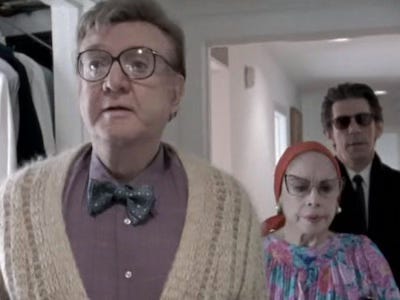It’s been a while, but we’re back with an actual Homicide Story! If you’re a paid subscriber, enjoy! If you’re not, you still get to read a chunk of this article and if you like it, sign up for more and get access to a bunch of cool stories from the archives, upcoming Live Chats, and announcements of Upcoming Events.
It’s gorgeously rare when this happens. For those of you who have listened to the Homicide: Life on Repeat Podcast or read some of these articles, my memories of working on the show can be a bit…foggy.
But on this episode? Oh my
Watching just the first frame of Episode 611, a mass of memories and images blew open the hatches. Probably because, as its director, I spent so much more time on it than I would have as an actor. And, as this was far and away the most cohesive (and enjoyable) directing experience I had on Homicide, those memories are equally delectible.
The joy started, as it always does, when I was given a terrific script written by Eric Overmeyer. He gifted me with two great storylines. One that gave the underappreciated Michelle Forbes a terrific spotlight as she unraveled a mystery and teased her audience with a murder/suicide conundrum told in flashback, featuring the dream team of Reed Diamond and Richard Belzer. The B story was a classic HLOTS dismantling of stereotyping versus political correctness, as seen through the clumsy yet endearing dynamic of the Callie Thorne and Peter Gerety partnership.
(A slight digression is in order: I was supposed to direct a different episode that season; one of our increasingly common action scripts, but that was instead given to Kathryn Bigelow, future Academy Award winner for The Hurt Locker, and cool films 90s films like Blue Steel, Point Break and Strange Days. The bosses made the right choice - and she did a brilliant job.
A further digression: Kathryn was a total pro who seemingly meshed perfectly with our crew. She had been directing for a while, so I assumed she was brimming with confidence and knew how to handle every situation. However, when we had lunch a few days before the start of her episode, she surprised me by asking, "How do you handle it when you have a differing opinion about a shot, or direction, with, say - Jean, the cinematographer, or one of the male actors, or producers? How do you think I should handle it?”
First, I thought, wow - she’s asking me??? I, who’d barely “directed” one episode. However, it was the early 1990s; female directors, especially those in action films, were a rarity. In fact, Kathryn may have been it! And she wanted tips on how to handle the different personalities around our set. It was a smart question for anyone to ask. But her being specific to the male of the species, I was again struck by the challenges Kathryn, or any woman director of that time, faced in our business. According to my dear friend, Google AI, Homicide employed “at least” nine female directors who helmed maybe 12-13 episodes out of 126 episodes, which was considered groundbreaking. A decade earlier, St. Elsewhere employed four women directing 12 out of 137 episodes. By 2022, across all episodic shows, 38-40% were directed by women.)
Keep reading with a 7-day free trial
Subscribe to Everything/Nothing with Kyle Secor to keep reading this post and get 7 days of free access to the full post archives.





